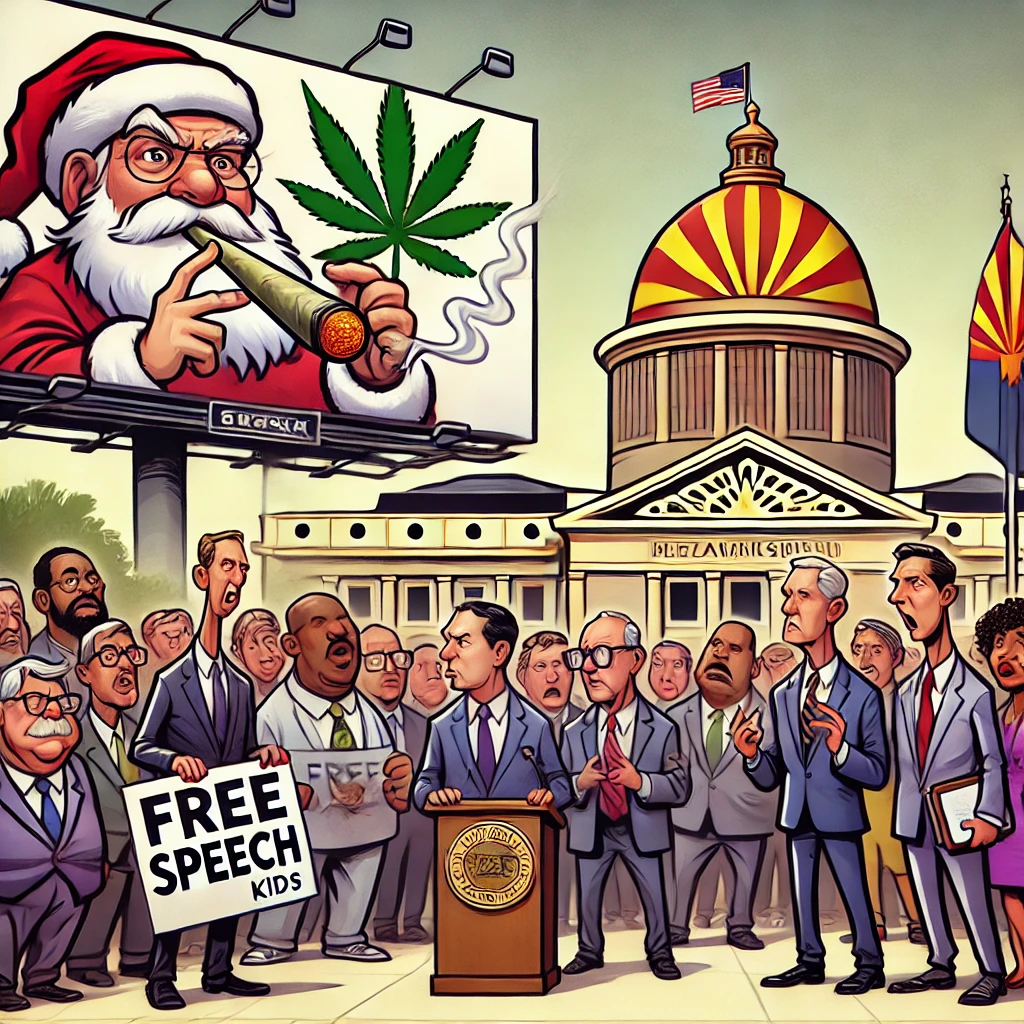Phoenix, AZ – Sparks flew in the Arizona House of Representatives on February 13, 2025, as lawmakers engaged in a debate over HB2179, a bill designed to tighten restrictions on marijuana advertising. The bill, championed by Rep. Selina Bliss (R-LD1), aims to curb marketing tactics that could appeal to children, drawing parallels to past crackdowns on tobacco and alcohol promotions.
Bliss, a nurse and Republican legislator, made her case by highlighting the well-documented playbook of the tobacco and alcohol industries. “Companies used cartoon mascots like Joe Camel and the Budweiser Frogs, product placements in movies, and sponsorships of youth-friendly events,” Bliss explained. “These strategies made smoking and drinking seem fun and attractive to children, which led to public backlash and tighter regulations. That is exactly the purpose of this bill.”
However, Rep. Alex Kolodin (R-LD3), a lawyer and vocal libertarian, pushed back hard, arguing that the measure tramples on First Amendment rights. “First things first, I vote no on all the marijuana bills that always come through the chamber because all they are is an attempt to, you know, engage in regulatory capture by one segment of the industry or another,” Kolodin asserted. “Second of all, the voters of Arizona already voted on this stuff. If they had wanted this stuff and what they voted for, they would have put it in what they voted for, but they didn’t. And the third and far the most important reason is just because we’ve started a precedent of violating the First Amendment in the past does not mean that we should continue to widen that precedent and violate the First Amendment more. We need to get away from that and go back to respecting our First Amendment. Some of the hell that we’ve lived through for the past four years has in fact been due to the fact that this society has gotten away from understanding and respecting the full breadth of the First Amendment. I will always stand for freedom of speech and I vote no.”
Rep. Matt Gress (R-LD4), a former public school teacher and school board member from Scottsdale, wasn’t having it. He fired back, saying the marijuana industry has had too much control over its own regulations. “The industry wrote that measure and they paid for that measure and they were going to put as few restrictions as possible in that measure so that they could market it and sell marijuana,” Gress argued. “What we’re talking about right here are billboards that are blatantly peddling marijuana to kids. Santa Claus smoking a blunt, cartoons glorifying marijuana use. Adamantly opposed to anything that loosens regulation on this dangerous drug. And I know some people may not find it dangerous. I think it is. And especially dangerous in the hands of kids. This is high time we certainly regulate the advertisements on marijuana and protect our kids and I vote I.”
Despite the fiery debate, HB2179 passed with a solid majority—51 in favor, 3 against, and 6 abstaining. The battle over marijuana advertising is far from over, but for now, lawmakers have taken a firm step toward greater regulation.
Before HB2179 made its way to Third read it went through COW or Committee Of the Whole
Bliss also talks about her COW amendment, that took place 3 days before on Monday February 10th. In the committee of a whole bliss stated about her amendment “We had a robust discussion and committee and we made this floor amendment to make changes and clarifications to address some of the testimony we heard. I want to point out the changes do not impact the sale of smoke shop paraphernalia products. Just prohibits those products from being advertised to children.That’s the whole point of this bill. Also the amendment exempts hemp products that are regulated by the Department of Agriculture from the purview of the bill. That’s to offer clarification and I could go into more deep tail but I think that’s good for now.”
However, the amendment does nothing to safeguard other proposed measures this session SB1556 Adult Hemp Beverages; Policies; Procedures; which would allow Creates a new “adult hemp beverage” (defined) category and regulates it similarly to spirituous liquor. It defines adult hemp beverages as low-THC drinks derived from industrial hemp and authorizes current liquor licensees—producers, wholesalers, retailers, and delivery contractors—to add permissions for manufacturing, distributing, selling, or delivering these products without a separate hearing. Sets a gallon-based tax rate of $1.50 for adult hemp beverages, requires laboratory testing for total THC potency and contaminants, and specifies packaging, serving size, and labeling requirements, including quick-response codes linked to lab reports. SB1702 Hemp-Derived Products; Regulation
Next up, HB2179 will cross over to the Senate, where it will undergo the same process all over again.
Key Steps in Arizona’s Legislative Process: Committee of the Whole and Third Read
As the Arizona Legislature moves through its lawmaking process, two critical steps help determine the fate of proposed bills: the Committee of the Whole (COW) and Third Read.
During COW, all members of either the House or Senate convene for a full-chamber discussion. Lawmakers debate the merits of a bill, propose amendments, and make final adjustments. While no formal vote occurs at this stage, the bill must gain enough support to advance. (Lawmakers normally won’t call a bill to Third/Final Read unless they know it will pass.)
Once a bill clears COW, it moves to Third Read, where lawmakers cast a final vote in its chamber. At this point, no further changes can be made—legislators must vote “yes” or “no” on the bill as written. If approved, the legislation moves to the opposite chamber to undergo the same process or heads to the governor’s desk. If rejected, the bill is typically considered dead unless revived through special procedures. (Strike all and amend everything, aka strikers.)


